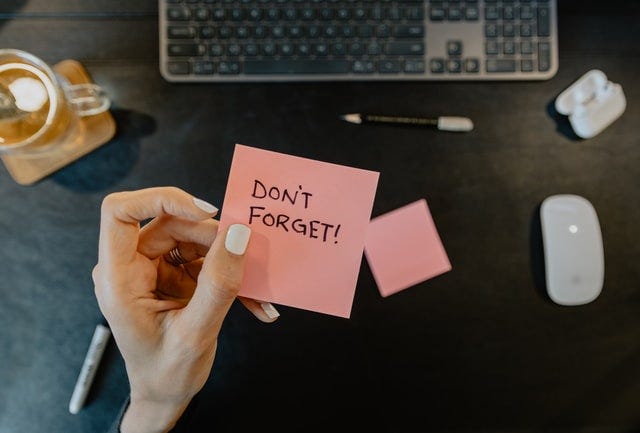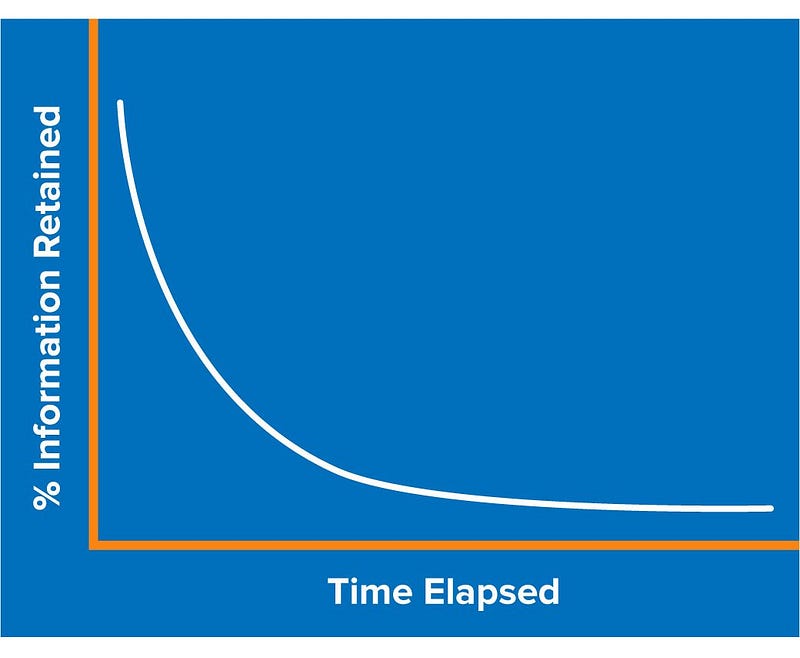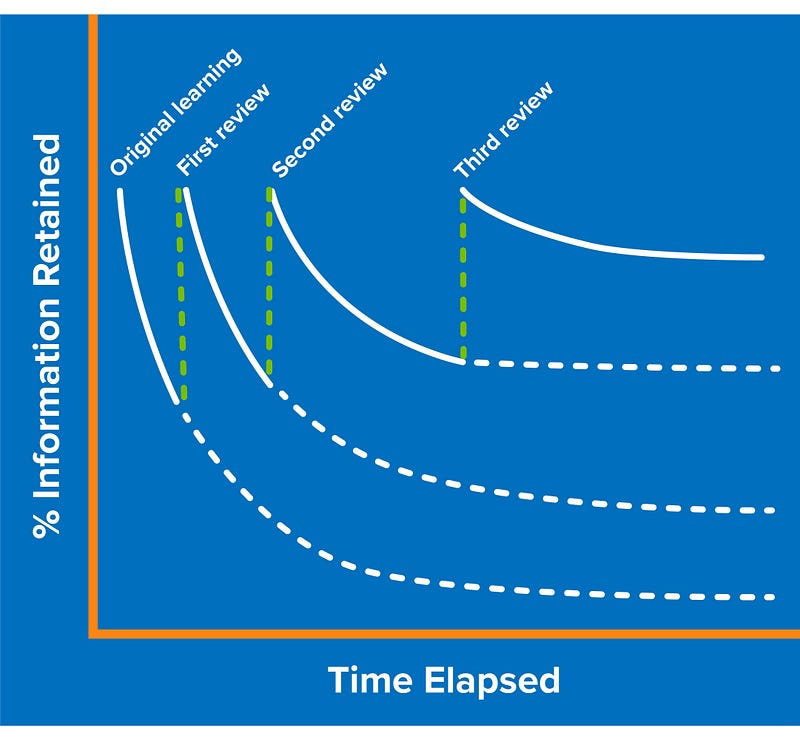Stop Forgetting What You Learn Using Learning Science
Stop Forgetting What You Learn Using Learning Science
Understand the basic principles of Learning Science to retain what you learn.
So. You’ve started learning something new. Maybe out of curiosity and an interest in mastering new things. Or maybe out of necessity, an upcoming test or exam perhaps.
But the knowledge isn’t sticking in your head.
Or the information seems to vanish from your brain, moments after walking out of the exam room, or even just after standing up from your desk.
Maybe the whole process of learning new things seems to be more challenging than it should be, and you can’t seem to make progress.
Hours spent trying to get the knowledge into your head seem to have been spent in vain.
“The advantage of a bad memory is that one enjoys several times the same good things for the first time.”
― Friedrich Nietzsche
Maybe in some contexts, Nietzsche. Not when it’s something I need to remember though.
Why doesn’t the information stick?

It’s safe to say that it’s not just you that has experienced, or are experiencing these challenges. It’s definitely something that I (and I’m sure many others) have struggled with for as long back as I can remember. I wouldn’t trust my abilities to pass many (read any) of the tests I wrote in undergrad..
Fact is, most of us were never taught how to learn things properly and had to figure out what we thought worked as we went. A lot of us still haven’t figured it out.
Thankfully though, all hope is not lost.
We don’t have to figure it all out on our own through trial and error.
There are fields of study, and researchers within these fields, fully focused on determining how to help people learn best, and the strategies that people can follow to get knowledge to stick. This area of research is widely known as the field of Learning Sciences.
“ The science of today is the technology of tomorrow.” — Edward Teller
With a basic understanding of the principles, incorporating some of these strategies into your learning practices can have results that are quite remarkable. It’s worked for me, countless others, and hopefully more people in the future, and is worth giving a shot. This sequence of articles is dedicated to providing that simple understanding, and exposing some of the fallacies of learning.
Learning how to learn, in my eyes, is a fundamental skill we should be taught from a young age. It’s useful for achieving any kind of learning goals and is an essential part of any toolkit. The framework can easily be adapted and implemented to fit with your desired outcome, and can even be applied outside of the classroom and exam hall. It’s not just for students or those studying for tests.
But what is learning science exactly?

By some definitions, Learning Science is an interdisciplinary field of science that is focused on developing and improving our understanding of the methodologies and solutions that help people learn things effectively. It incorporates findings and study from multiple fields such as cognitive neuroscience, cognitive psychology, instructional design, education and computer science, among others..
It’s also a relatively new field of study, and the way that it is being defined is changing over time as new niches of the field are discovered, and more data becomes available.
Before we dive into some of latests findings in the field, and how to use them to remember things more effectively, let’s recap what the process of learning and remembering things entails.
The Learning Process
Fundamentally, learning occurs in 3 steps. Namely: encoding, consolidation and retrieval. In short, these can be summarised as follows:
1 — Encoding
This is where new information and material is received and encoded into short-term memory. These mental patterns are largely disorganised and most of this information is forgotten.
2 — Consolidation / Storage
This is the stage where material stored in short-term memory is moved over into long-term memory. This is aided by linking the new material with past experiences and things already in long-term memory.
3 — Retrieval
This stage occurs when the material is fetched from long-term memory and brought back into short-term memory. This process reinforces the knowledge and reconsolidates it with any new information that has been gathered.

The more knowledge we can get from short-term memory into our long-term memory, the more we’ll remember over time. So, although during the first stage, encoding, where we come across new and novel information, it’s important that the information is presented in a way we can understand, the consolidation and retrieval steps of learning are where the magic happens for knowledge retention.
“The beautiful thing about learning is that nobody can take it away from you.” — B.B. King
Assuming we understand the concepts we’re learning (big assumption, and not for this discussion), these consolidation and retrieval steps are where we want to make sure we double down of efforts to make sure things make it out of the sieve that is our short term memory.
I’m not going to go into much more detail about the science behind it, but if you want to learn more about the steps and their intricacies, have a read through this blog here - and this report.
On one hand, we have the steps involved with learning, focused on getting the information in. But on the other, we have its opposition. The yang to the yin of learning. Forgetting. The natural process whereby we, well, forget things…

As frustrating as it is to forget things we’re trying to learn, it’s something that we can understand and master. How exactly would that work though?
The Forgetting Curve
Even if we have something in mind that we believe we’ll “definitely” remember today, tomorrow, and even next week. Chances are, if we don’t engage with (retrieve) that information for several days, weeks or months, it’ll eventually slip from our mind and need to be relearned. This process of knowing and forgetting has been represented as Ebbinghaus’s Forgetting Curve.

The short of it is, that over time, we are able to retain less and less information. This is caused by various factors, such as:
- Our understanding of the information;
- The meaningfulness and relevance of the information to us;
- Various Psychological Factors (Stress, sleep, etc)
“As you get older three things happen. The first is your memory goes, and I can’t remember the other two.” ― Norman Wisdom
Thankfully, our default nature of being forgetful can be overcome.
By actively engaging in the retrieval step of the learning process, knowledge is less likely to slip from our long-term memory. The more we engage in retrieval, the more deeply embedded and less likely to be forgotten the knowledge will become. I’ll cover more of this in a bit, and, if interested, you can read more about the forgetting curve and some of the work done on it here.
So, that’s fairly logical, and nothing new to you I’m sure. We all seem to forget things. And I’m sure you’ve tried some ways to get around it. I bet you’ve narrowed down some kind of go-to method or study techniques to help you remember more, faster. But are these the best way to do things? Are your tips and tricks effective ways to learn?
But are they really?
How can you save yourself time, effort and the frustration of studying in ways that aren’t actually helping you to retain more information?
By learning how to learn effectively.
Learning Effectively
One of the key things that stood out to me while doing my research, and reading ‘Make it Stick’, was that the most impactful learning happens when you test the edges of your abilities and knowledge. We need to slowly challenge ourselves in order to make progress (this is also something that is not isolated to learning!).

The best results come from making mistakes, learning from them, challenging yourself, and consolidating what you learn as you go.
There is a desirable amount of difficulty required, and experiencing this challenge is a sign you’re on the right path. If it feels really easy, either you already know what you’re learning, or you’re probably not going to remember it for very long.
That’s not to say that it should feel like you’re throwing yourself off a cliff. The difficulty level should be enough to keep you engaged and require some thought. And if the process is frustrating you extensively, dialing the challenge back slightly might help keep you from turning away entirely. It may take some playing around to figure out where your edge lies, and how to stay there. But that’s also part of the journey.
We need to work both smart and hard, which requires effort and embracing difficulty.
Although the learning itself is not supposed to be easy (like reading and rereading notes is), it doesn’t mean that the process you follow can’t be simplified and easy to implement. By understanding the key principles behind effective learning, they can be put into practice in any way you choose and applied to help you reach your learning goals.
So, how exactly can you learn things more effectively…
In summary, the findings and lessons from research in cognitive psychology can be boiled down to three key strategies. There are more, but as a place to start, these will add the most value from the get-go.
- Active retrieval;
- Spaced repetition; and
- Interleaving.
1. Active retrieval
Don’t: Mindlessly read, summarise, highlight, reread, etc.
Do: Apply active, effortful recall. Find ways to test yourself frequently.
Active retrieval requires engagement with the content you’re learning. It requires putting yourself through challenges and exercises that engage with your ability to recall knowledge. The more we test our ability to retrieve information from memory, the more likely it is to stick in there for the long term.
Quiz yourself, do practice questions, make your own tests, assessments and flashcards. It’s not supposed to be effortless or easy. It’s the act of needing to think about (or relearn) an answer that solidifies it in your mind.
Don’t put too much pressure on yourself for getting everything right all the time. Low stakes but frequent self-testing is a helpful way to frame this. Anything you get wrong along the way will provide you with an opportunity to cement your knowledge and relearn what you’ve missed or forgotten. Adopting the right mindset helps you get through these. It also helps you get a more accurate sense of your knowledge retention.
Just because something seems familiar when you read it doesn’t mean you’ll be able to recall it from memory.
2. Spaced repetition
Don’t: Learn once. Not review what you’ve learned.
Do: Use spaced and varied review periods to test yourself.
If we think back to The Forgetting Curve that was covered earlier, that’s not really the trend anyone wants their knowledge retention % to unfold as over time (well, not what I want at least). Spaced repetition is the system that can be used to fix that though.
It requires is adding deliberate breaks from learning pieces of knowledge, to allow yourself some time to start forgetting it. When first learning something, these intervals can be short: 15m, 2h, 1d. And, as you become more confident with the material, the intervals can grow to span days, weeks, and even months. The more time you begin to allow between the reviews, the more entrenched the knowledge will become in your long-term memory.
There’s no point jumping straight to longer intervals though, you need to build it up over time, and be willing to shorten them again if you’ve forgotten something.
The image below illustrates a much better knowledge retention % which is driven by reviewing information and spaced intervals.

You can figure out these intervals on you own based on what works for you. Or you can use applications to help determine the intervals for you. It forms a big part of what we’re building at Beeline, and by leaving the application to take care of the learning science for you, it free’s you up focus exclusively on the content you’re learning.
3. Interleaving
Don’t: Focus on learning only one thing at a time.
Do: Mix different problems, topics, and pieces of information together.
Rather than practicing or studying one thing over and over, in one way, until you think you’ve got it, it’s better to vary how and what you’re practicing or learning. This can be done by adding different types of problems, topics, and practices into your process. Deliberately cover more than one topic during a day, or make sure to incorporate different exercises and problems into your study program.
Sure, by bringing in other bits of information, it might make things a bit more challenging. Thankfully we’ve already outlined that this small additional challenge is actually a good thing. By having to engage in active retrieval of different pieces of knowledge in our memory, more consolidation takes place. And we are able to improve the amount of information we are able to retain.
Interleaving helps us learn more, faster. And has the added benefit of keeping the learning process more interesting. Instead of grinding away our motivation on a single focal point, mixing it up as we go can help keep us engaged and interested.
Finally, tying it all together
We’ve covered a lot together here.
I’m glad that you’ve made it (or skipped ahead) this far. It’s a lot to digest, and it took me some time to wrap my head around it. But I’m personally feeling much better equipped to tackle my learning now. Hopefully one or two of the messages and takeaways above will stick with you ;)
To summarise:
- We forget things. Probably more than we’d all care to admit or than we even realise.
- When it comes to learning: easy, fast, and familiar does not always mean effective.
- Making mistakes (and being comfortable with doing so), challenging ourselves, and testing our abilities is a crucial part of the process.
- Just because the learning itself might be challenging, it doesn’t mean that the process needs to be.
- Mixing in different methods and topics with each other while we learn, instead of sticking to a single-minded focus, enables us to expand our knowledge faster.
- Spaced repetition is your best friend. Allow yourself some time to start forgetting, then test yourself and your recall. Soon that knowledge won’t be going anywhere!
An afterthought
There are so many more components, external and internal, that play a role in the way we learn things and our abilities to do so. I haven’t even had a chance yet to touch on subjects such as collaboration, goal setting, dopamine, learning in public, habit building, sleep, hydration, exercise, and plenty of others. I feel like I’m just starting to scratch the surface.
So.
I’m going to be going further down the rabbit hole.
And am excited to be doing so.
I’d love to bring you along with me.
Enjoy learning effectively
I’ll be keeping everyone updated through the Beeline mailing list and my articles on Medium and on Beeline. We’re using these tools and principles to improve the learning, training and development processes for individuals and companies — take a look!
I’d love to talk, discuss ideas, collaborate and try and bring this kind of information to everyone! Please reach out :)
All references and original sources have been linked in the text. Thanks to all the smart people out there that have dedicated their time to helping distil all the key information into a more digestible form.
Frequently Asked Questions (FAQs)
1 — How can applying learning science principles make the learning process more effective?
By integrating learning science principles, such as understanding how memory works and leveraging effective study techniques, learners can significantly enhance their ability to absorb, retain, and apply new information, leading to a more efficient and impactful learning experience.
2 — What are the key strategies for retaining information according to learning science?
The key strategies include actively recalling information, spacing out learning sessions, and mixing different topics or types of information to improve long-term retention and understanding.
3 — How does Beeline utilise learning science to enhance individual and organisational learning?
Beeline leverages these learning science principles to create structured learning pathways, offering tools for spaced repetition and active recall, making it easier for users to retain information and track their learning progress effectively.